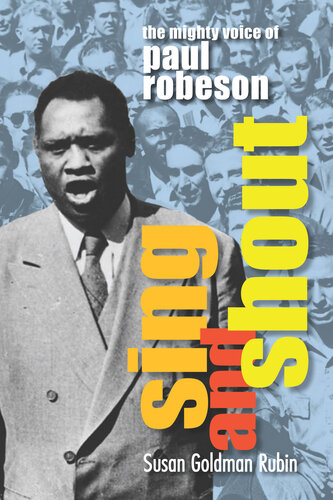
Sing and Shout
The Mighty Voice of Paul Robeson
فرمت کتاب
ebook
تاریخ انتشار
2020
Lexile Score
1050
Reading Level
6-9
نویسنده
Susan Rubin Goldmanشابک
9781644720523
کتاب های مرتبط
- اطلاعات
- نقد و بررسی
- دیدگاه کاربران
نقد و بررسی

Focuses on Robeson's rich, multifaceted legacy, including how his love for song served as a touchpoint throughout his historic life. A veteran author for younger readers, Rubin provides a meticulously researched biography that integrates numerous archival images. This offering foregrounds Robeson as a powerful, studied voice of Negro spirituals, a black folk music tradition rich in religious symbolism that arose in response (and resistance to) enslavement in the U.S. Lyrics from Robeson's repertoire form the titles of chapters, which cover his birth in Princeton, New Jersey, in 1898; his childhood and youth; his triumphant global following in the 1930s and '40s; the turbulent 1950s, when he became a primary target of Cold War McCarthyism; and his final years in Philadelphia. Harry Belafonte, Robeson's mentee, provides a preface, declaring his significance as a champion of the oppressed as being on par with that of Dr. Martin Luther King Jr. With such an exceptional man, it would be easy to simply submit to hero worship, but Rubin lays out Robeson's lifelong evolution on a number of personal and political issues in dialogue with his wife, Eslanda, and other noteworthy figures. Readers can expect to sit with these lessons from the committed life of one of the 20th century's most resonant voices. A rigorous, relatable text about one of America's all-time entertainers and social activists. (preface, foreword, note on terminology, personal note, bibliography, Robeson's music, Harlem walking tour, source notes, index, picture credits, text and song permissions) (Biography. 12-adult)
COPYRIGHT(2020) Kirkus Reviews, ALL RIGHTS RESERVED. (Online Review)

May 1, 2020
Gr 6 Up-Readers of this thorough biography might ask themselves, "Is there anything Paul Robeson couldn't do?" Robeson was one of the first Black students to attend Rutgers University, where he excelled at football and academics. Despite his many talents, Robeson couldn't eat in a restaurant or stay at a hotel with his teammates when he traveled with this team because of Jim Crow laws. After a brief stint at New York University School of Law, he moved to Harlem in 1920 to attend Columbia Law School. After he graduated in 1922, he briefly pursued a career as a lawyer. Robeson gained fame with his marvelous singing voice, performing spirituals in concert, acting in plays, and appearing in hit films like Show Boat. He aimed to portray dignified African Americans in plays and films at a time when roles for people of color were relegated to degrading stereotypes. One of his biggest triumphs was portraying Othello on Broadway in 1943. As time went on, he devoted more energy to speaking out about civil rights. Robeson made connections between groups facing oppression across the globe, including those under Nazi occupation during World War II, fascist rule during the Spanish Civil War, apartheid in South Africa, and Black people in America. J. Edgar Hoover and the FBI labeled him a communist and took away his passport during the 1950s, but Robeson never stopped fighting against injustice. VERDICT Middle and high school students will find inspiration in the life of this fascinating figure in African American history.-Amy Duffy, Chicago Public Library
Copyright 2020 School Library Journal, LLC Used with permission.

April 15, 2020
Grades 5-8 The opening vignette in Rubin's detailed look at a Renaissance American shows Robeson performing in 1925's music event of the year, a New York City concert where he broke barriers by singing Negro spirituals. (The author explains that the book quotes terms from Robeson's era that are now avoided.) The wildly acclaimed concert was just one triumph in the life of this remarkable performer, sportsman, civil rights champion, and son of a runaway enslaved man. Rubin presents Robeson's life in short chapters starting with his childhood, which was marred by his mother's early death, and continuing through his life as a young father, when his increasing success made his marriage rocky, to his controversial life as an outspoken critic of conditions for African Americans. Readers will find the writing clear if at times choppy; throughout, it is complemented by clearly reproduced black-and-white images of Robeson, his family, and others, which help bring the era to life. More than 50 pages of back matter, mostly extensive notes, create opportunities aplenty for further research. A quality choice for history and biography shelves.(Reprinted with permission of Booklist, copyright 2020, American Library Association.)

June 1, 2020
Rubin (Give Us the Vote!) skillfully recounts the life of outstanding student, athlete, actor, singer, and social activist Paul Robeson (1898–1976), interlacing narrative of his artistic career with commentary on his position on and accomplishments as a champion for black rights. From his father, a minister who escaped enslavement, Robeson inherited a powerful, mellifluous voice and strong principles. A Phi Beta Kappa student and football star at Rutgers, where he was initially the sole black student, Robeson earned a law degree from Columbia University but instead chose an artistic career. He achieved both financial security and international recognition by popularizing spirituals via concerts and starring in Show Boat, as Othello in Broadway’s longest-running Shakespeare play, and commercially successful films. During the 1930s, Robeson increasingly used his prominence to criticize fascism and advocate for human dignity. His activism attracted unfavorable attention from the FBI, which rescinded Robeson’s passport. A lifelong nonconformist, Robeson brought joy to audiences and inspired a generation of civil rights leaders. Rubin appends a comprehensive bibliography, listing of Robeson’s music, and Harlem walking tour recommendations to her sympathetic, lucid portrait of a great voice. Ages 12–up.

























دیدگاه کاربران